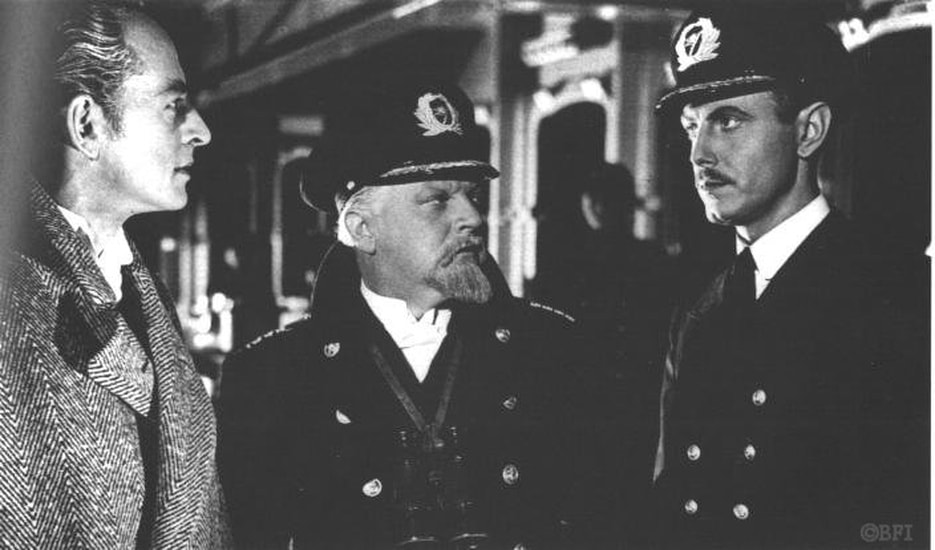If the movie title Titanic is used during a conversation, one of two particular motion pictures will usually spring to mind: James Cameron's 1997 blockbuster, or Jean Negulesco's 1953 drama. However, this review concerns none of the aforementioned movies - this is a review of the 1943 Nazi propaganda movie entitled Titanic; a feature which suggests that the sinking of the famous 'unsinkable' ocean liner could have been avoided if the powers that be had listened to the only German officer on the ship. As an instance of moviemaking, 1943's Titanic is nothing to get excited about, but as a historical artefact which demonstrates how demented the Nazi party was, Titanic is something of great interest.
If you're not familiar with the story of the RMS Titanic, here it is in short: it was the largest ship ever made at the time, and was touted as "unsinkable". During her maiden voyage in 1912 across the North Atlantic Ocean, she struck and iceberg and sunk. With not enough lifeboats to save all the passengers, the disaster led to the deaths of over 1,500 people.

Front and centre in this particular motion picture is the propagandistic message of British greed, ignorance and arrogance. The film's first section reveals that White Star Line president Bruce Ismay (Fürbringer) is anxious to improve his company's stock performance. In bringing this plan to fruition, Ismay bribes the Titanic's captain with a substantial cash bonus for an early arrival in New York, thus endangering everyone on-board. Among the Titanic's crew is German officer Herr Peterson (Nielsen), who urges that heed be paid to the constant ice warnings and dropping temperature. He is ignored and reprimanded by his superiors, of course, and when the ship collides with an iceberg Peterson is the only one to behave nobly.
Titanic was green-lit because Nazi propaganda minister Joseph Goebbels perceived the real-life disaster as a great example of British incompetency. It was the most expensive German movie up until that time, and endured countless production difficulties. Before shooting had been completed, the film's director, Herbert Selpin, was overheard making disparaging remarks about the German navy. His remarks were relayed onto the Gestapo, who arrested him and threw him in prison. The following day, Selpin was found hanging in his cell. Production continued nevertheless, and the movie was eventually completed by new director Werner Klingler. The night before Titanic's debut in Germany, however, the building which housed the premiere print was destroyed in an air raid. Goebbels - who had already endured protests over the treatment of Selpin - subsequently sensed the sequences depicting shipboard panic in the movie too closely echoed the actual panic of the German population (who were subjected to nightly bombings), and decided to ban the film. It was only seen after extensive cutting in occupied Paris. Hitler's Germany never saw the movie.

Most of principal photography for Titanic took place on-board the SS Cap Arcona; a passenger cruise ship which itself sank in the last weeks of World War II, resulting in a loss of life far heavier than that of the actual Titanic. The sets in general are impressive and expansive, and the flooding sequences were pulled off competently. That said, none of the locations look anything like the actual Titanic. This extends to...pretty much all the action which doesn't feature the detailed model. Watch as the officers on the ship see the iceberg, and order a searchlight be shone upon it. Never mind that searchlights were never installed on the Titanic, and the model for the wide shots does not include said searchlight... As a consequence of such carelessness, it's difficult to accept this as a Titanic picture. It's also difficult to accept the Titanic passengers as British, because each speaks fluent German with a perfect German accent.
The real concern with films of this nature is how effectively they work as a spectacle, and Titanic is simply not much of a spectacle at all. It runs at a brisk 85 minutes, but the ship hits the iceberg about halfway through the movie, which just leads to some merely passable model work, some "I told you so" posturing by the stoic officer Peterson, and a number of perilously naff moments. Consider, for instance, that the Titanic's final 90 minutes unfolds in 5 minutes. The model of the ship sinks impossibly quickly, and it's more amusing than moving. The character drama is at times compelling, but Titanic is never thoroughly engrossing. There isn't a great deal of worthwhile character development, and thus everyone is fairly two-dimensional.

Taken as a standalone movie, Titanic is too laughable and not overly effective, though it's still an interesting and recommended watch. Those intrigued by the Titanic disaster should make a particular effort to watch this movie, as it's a fascinating glimpse into a chapter of history we rarely see. Of course, too, it's recommended to those who are merely curious to see how demented the Nazis were. Most interesting is the blatant piece of propaganda at the very end when a title card is displayed that reads: "The deaths of 1,500 people remain unatoned for, an eternal condemnation on the English quest for profit".
5.4/10
 Login
Login Posted : 14 years ago on 7 May 2010 03:44
Posted : 14 years ago on 7 May 2010 03:44
 0 comments,
0 comments,